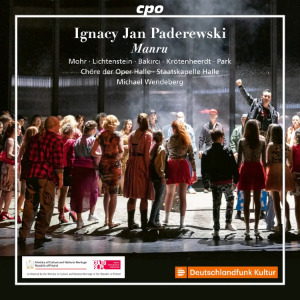
Ignacy Jan Paderewski (1860-1941)
Manru, lyrical drama in three acts with a libretto by Alfred Nossig
Thomas Mohr (tenor): Manru
Romelia Lichtenstein (soprano): Ulana, his wife
Gabriella Guilfoil (mezzo-soprano): Hedwig, her mother
Levent Bakurci (baritone): Urok, her confidant
Ki-Hyun Park (bass): Oros, chief of the Erumanels
Franziska Krötenheerdt (soprano) :Asa, his beloved
Staatskapelle Halle/Michael Wendeberg
rec. 2022, Halle Operahouse, Halle, Germany
cpo 555 553-2 [2 CDs: 139]
The 1901 premiere of Manru in Dresden was an outstanding success. Paderewski was called to the stage some thirty times. The work had been commissioned with a German libretto by the Director of the Royal Opera House in Dresden, who conducted its first performance. Perhaps even someone as accustomed to fame and approbation as Paderewski might have been surprised, and certainly gratified, at the work’s rapid uptake in Kraków, Prague, Cologne, Zurich, New York, Boston, Chicago, Pittsburgh, Baltimore, Warsaw, Budapest. Nice, Monte Carlo, Bonn, London, Moscow and Kiev.
There were clouds on the horizon, though. In 1904, Paderewski undertook a seventeen-city, three-month concert tour across Germany; he was then probably the most famous pianist in the world. The Polish press criticised as unpatriotic his collaboration with German concert producers in cities that had many Polish residents. For context: by 1795 Poland had been partitioned between Germany, Austria and Russia, and had ceased to exist as a separate state. Unsurprisingly, nationalistic feelings still had some force. Paderewski responded by donating large sums to Polish charities and financial institutions. Then the German press reacted: they accused him of spreading anti-Prussian propaganda and abusing German hospitality. There were protests against him in Cologne, whereupon Manru vanished from the stage. It remained in limbo, except in Poland after Worl War I, where occasional performances occurred. There is a detailed synopsis on OperaToday.
This fine two-disc set of the complete opera shows that Paderewski tended more toward the German style of opera than the extreme use of Polish folk songs. The folk idiom is sometimes present, for example in the village green scene in the first act and in the third scene, and this is set to words when the village girls mock Ulana with a prediction of Gypsy faithlessness in marriage. (That would be considered racist these days.) Folk material also appears all along in the orchestra. Incidentally, Paderewski said that such melodies in Manru were his creations. He might have done this to prove that, even though Poland did not exist, Polish national melodies were still effective, even when newly written.
There is no doubt that Wagner is an influence, and there is a distinctly Germanic cast to the orchestration – nothing exotic in the instrumental line! Vocally, there are several declamatory passages, and even a suggestion of verismo in the dramatic final scene where both the hero and heroine die by suicide or murder.
Melodically, the opera does not strike me as having stand-out moments. I have not noticed anything that emulates the gentle melodic beauty of Paderewski’s Piano Concerto, for example. Repeated listening may impress me more.
There are no weak links in the cast, except that Romelia Lichtenstein as Ulana does not sound like a young girl, even if her voice is firm. There is an affecting scene between her and Thomas More’s Manru at the opening of act II. She rocks her baby’s cradle whilst he admires her, yet longs for the Gypsy life he has left behind to be with her. The ending of the same act is a love duet. Ulana persuades Manru, who is on the point of leaving the village, to drink a love potion. It works, and an ardent love duet follows, which suggests that Paderewski knew Tristan!
I have a criticism of the recording. While full and clear, it gives rather too much emphasis to the voices, placing them too forward of the orchestra. The orchestra has a strong effect when playing by itself, as in the symphonic prelude to Act III, so this is a minor complaint. Conductor Michael Wendeburg leads his orchestra, chorus and soloists in a committed, propulsive performance. The booklet contains comprehensive information about the history of Manru and the performers in this recording, plus with a full libretto in German and English.
All in all, this most welcome recording firmly demonstrates that Paderewski was far more than a composer of salon trifles. The label is to be commended for issuing the opera in association with the German National Radio Deutschlandfunk Kultur, the Polish Ministry of Culture and National Heritage, and the Adam Mickiewicz Institute. The latter’s mission is to build globally a lasting interest in Polish culture.
Jim Westhead
Help us financially by purchasing from


Additional cast
Andrew Nolen (bass): Jagu, Geiger/fiddler
Theodor Toschev: Geige/violin
Christina Mattai, Kaori Sekigawa: village maidens
Sebastian Byzdra, Kathrin Herold: voices from the mountains
Children & Youth Choir of the Halle Opera

















